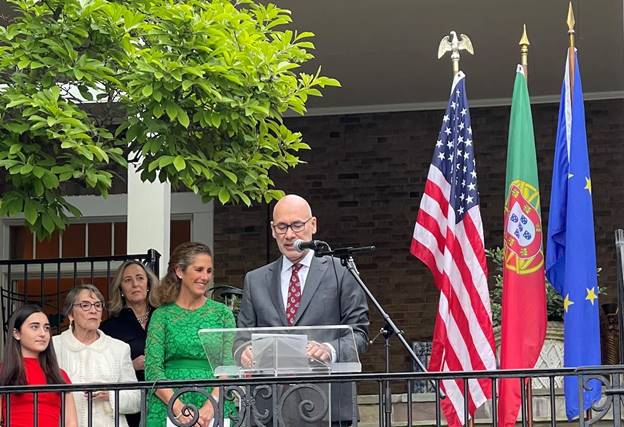
Celebrating the 50 th Anniversary of the Coup that Restored Democracy in Portugal
By C. Naseer Ahmad
Washington, DC

In a recent report by the Associated Press, we learned that tens of thousands of people attended the joyful celebrations of the Carnation Revolution. This important event marked the end of a four-decade dictatorship established by Antonio Salazar and paved the way for Portugal's entry into the European Union in 1986.
And now, on April 25, 2024, in Washington, Ambassador Francisco Duarte Lopes graciously hosted a reception at his residence to commemorate the 50th anniversary of the coup that restored democracy in Portugal. Against a picturesque backdrop adorned with the flags of the US, Portugal, and the European Union, Ambassador Duarte Lopes warmly welcomed the large audience. He highlighted the immense significance of the event, which not only brought democracy but also ushered in remarkable improvements in education, health, and economic prosperity. The ambassador also acknowledged the instrumental role played by then-US Ambassador Frank Carlucci, who later served as US Secretary of Defense. Mr Carlucci's diplomatic engagement with various stakeholders during those challenging times was invaluable. Joining his husband on the stage, MrsCarlucci received a well-deserved round of applause.
The audience, which included US government officials, diplomats, military attaches of Portuguese-speaking countries, as well as ambassadors from Azerbaijan, Bosnia, Macedonia, and many other nations, was a vibrant blend of cultures. Portuguese Americans, brimming with pride, enthusiastically applauded Ambassador Duarte Lopes' inspiring remarks.
Born in Castelo Branco, Portugal, Ambassador Duarte Lopes holds a law degree from the prestigious Faculdade de Direito de Lisboa. He began his professional service as an attaché in the Consular Section of the Foreign Ministry in 1989. Notably, he was later posted to Pakistan from 1993 to 1995—an experience he cherishes dearly.
On April 25, 1974, the Armed Forces Movement carried out a historic military coup that brought an end to the dictatorial regime initiated by António de Oliveira Salazar in 1932. This revolution, widely known as the 'Carnation Revolution,' was met with overwhelming support from the Portuguese people. They welcomed the soldiers by placing carnation flowers in the barrels of their guns, symbolizing love, and peace. The revolution's impact was far-reaching, bringing an end to the colonial war fought in former Portuguese territories such as Angola, Guinea-Bissau, and Mozambique.
One of the prominent figures behind the Armed Forces Movement was Otelo Saraiva de Carvalho, born in Maputo (formerly known as Lourenço Marques until 1976), Mozambique. As a person of Luso-Goan (Portuguese-Indian) ancestry, he became a prominent icon for leftists, but his military and political career sparked controversy among many conservatives.
It is interesting to mention that while coups are often associated with chaos and negative consequences, the Portuguese experience was unique. Despite some initial turbulence, the end result was undeniably positive, which is why it is remembered as the Carnation Revolution rather than simply as a coup. Furthermore, it led to the repatriation of countless Portuguese individuals from the colonies, forcing them to rebuild their lives in Portugal from scratch—a process that required significant time and effort.
Adding a touch of romance to the ceremony at the Portuguese Ambassador's residence was the opportunity to meet a couple whose marriage was made possible thanks to the Carnation Revolution. Pedro, the husband, would have continued to live in Mozambique and never met his Brazilian-born wife if his parents hadn't been forced to move to Portugal when he was sixteen. Pedro became an information technology expert and met his wife online while trying to set up a business in Brazil. Both were elated to be part of the celebrations.
Unfortunately, Pakistan, a country that has experienced multiple coups—including the most recent one twenty-five years ago—has not seen an increase in education, health, or economic stability. The country continues to grapple with an imbalance in civil-military relations. Perhaps, both the civil and military leadership can learn some valuable lessons from the success of the Carnation Revolution in Portugal five decades ago.
As we celebrate the 50th anniversary of this pivotal moment in Portugal's history, let us continue to honor the legacy of the Carnation Revolution and the profound impact it had on the nation's journey toward democracy, progress, and unity.

